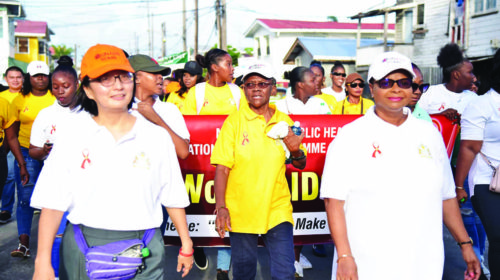
As Guyana joined the rest of the world in observing World AIDS Day on Sunday, the Pan Caribbean Partnership against HIV and Aids (PANCAP) is rallying its efforts to place much-needed emphasis on the need for communities to be involved in the fight against HIV/AIDS (Human Immunodeficiency Virus and Acquired Immunodeficiency Syndrome).
World AIDS Day was observed on December 1, and this year’s theme is “Communities Make the Difference”, in recognition of the contributions of communities to the AIDS response globally.
The advocacy of these social units has brought about the establishment of many notable projects such as Global Fund, and the United Nations General Assembly Special Session on HIV and AIDS, all in an effort to address the global epidemic.
This was according to PANCAP’s Director, Dereck Springer, who was at the time giving remarks at the agency’s World AIDS Day observance exercise 2019 at the Caricom Secretariat on Friday.
“The observance of World AIDS Day is an important opportunity for stakeholders to recognise the essential role that communities have played and continue to play in the AIDS response at the international, national and local levels … and so community activism was what was responsible for the establishment of this organization called PANCAP; it is that was responsible for the first UN General Assembly Special Session on HIV and AIDS, which was held in June, that really called attention to the world that HIV is an developmental issue not an health issue,” Springer noted.
The Director further expressed optimism on PANCAP’s, and other partnering agencies’ efforts to reduce risks and vulnerability to the incurable disease.
“But I hope that this tradition that we have now established will continue and that we will continue to see bold leadership in the response to HIV in this Caribbean region … and so within the Caricom Secretariat, we hope that we can ensure that we reduce risks and vulnerability to HIV,” Springer asserted.
Meanwhile, Assistant Secretary-General at Caricom, Dr Douglas Slater, in expressing hope that HIV/AIDS would be eradicated by 2030, also acknowledged the difference communities could make, especially at a time when finances to fight the disease are reduced.
“This year’s observance is occurring at a time in our Region’s history where there’s reduced donor funding for HIV and AIDS, our Governments and civil society organisations face the task of adapting their life-saving initiatives in an environment of reduced financing from development partners for HIV prevention, support, and treatment,” Slater highlighted.
Back in September, it was revealed that an estimated 8200 persons are infected with HIV, with only 93 per cent knowing their status. This was as the country surpassed the target in the UN’s AIDS “90-90-90” target.
On Sunday, the World AIDS Day observation commenced with a walk hosted by the National AIDS Programme Secretariat, among other events.



